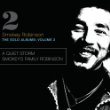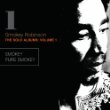Smokey Robinson
Smokey Robinson
Available Music
Reviews
| Song of the Month - Darnell Kendricks - "What a Wonderful Night" |
| Choice Cut - Christian de Mesones feat. Nes Powers - "Stay" |
| Video of the Month - Helen Bruner and Terry Jones - "You Got Me Feeling" |
| Listen Now! - The Fresh Soul Playlist |

 The man Bob Dylan once called one of America's greatest poets began mastering his trade inauspiciously, writing poems at Detroit's Dwyer Elementary while avidly listening to soul and classic popular music. He continued honing his writing skills in high school and formed a local singing group called the Matadors. But it was his chance meeting with fellow Detroiter Berry Gordy that changed Smokey's life. Gordy signed the Matadors (then called the Miracles) and mentored Smokey on songwriting skills, helping the young protege turn clever but disjointed rhymes into three minute short stories. The result was the best songwriter in America during the early 60s, churning out classic cuts for the Miracles, the Temptations, Marvin Gaye and others. While his songwriting star at
The man Bob Dylan once called one of America's greatest poets began mastering his trade inauspiciously, writing poems at Detroit's Dwyer Elementary while avidly listening to soul and classic popular music. He continued honing his writing skills in high school and formed a local singing group called the Matadors. But it was his chance meeting with fellow Detroiter Berry Gordy that changed Smokey's life. Gordy signed the Matadors (then called the Miracles) and mentored Smokey on songwriting skills, helping the young protege turn clever but disjointed rhymes into three minute short stories. The result was the best songwriter in America during the early 60s, churning out classic cuts for the Miracles, the Temptations, Marvin Gaye and others. While his songwriting star at 

